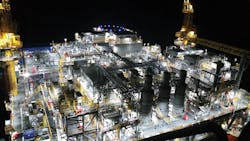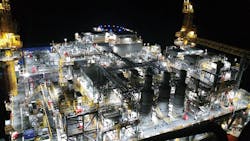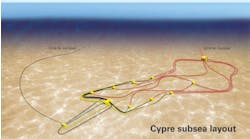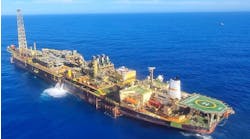Technology expands visualization into process control operations
Brad Vicknair
Rockwell Automation
Despite the company’s relatively small size among oil and gas industry giants, LLOG is the fifth largest operator in the Gulf of Mexico. The company’s success rate of drilling exploratory wells is 70%, compared to an industry average of approximately 35%.
In 2012, LLOG wanted to achieve production from multiple discoveries in the Mississippi Canyon protraction area as quickly as possible. The company developed a schedule with just three years to build a new, automated floating production system (FPS) in the deepwater Gulf of Mexico.
At this time, the company had one successful FPS, Who Dat, producing from nine wells. LLOG studied the underwater landscape, negotiated a final agreement, and began construction of a new FPS to act as a hub in the Gulf of Mexico’s Mississippi Canyon – Delta House.
With 36 months to complete design, implement, and drill, the operator was required to work under an accelerated build schedule. Beginning engineering work prior to oil discovery in the area facilitated the fast schedule. This early engineering was a bold endeavor, but a leap it was willing to take due to the company’s higher than average success rate and large prospect inventory. It was also comfortable that the new design could accommodate a wide range of possible oil characteristics.
A typical deepwater approach for new drill FPS’ includes oil discovery, identification of well locations, a front-end engineering and design (FEED) study, a bid for production FPS types, then detail design and, only then, can construction begin. This traditional approach typically takes several years before first oil is produced.
With the PlantPAx DCS, LLOG has expanded visualization into its process control operations on the Delta House FPS. (Image courtesy LLOG)
The unique timeline for the new Delta House FPS was far more compressed. In addition to an accelerated timeline, LLOG was also looking to commission, design, and implement a completely different process control system than the existing proprietary system deployed on Who Dat.
“The controls system on Who Dat wasn’t easily scalable,” said Rick Fowler, COO, LLOG. “With our new Delta House FPS, we knew we needed a process control system that would be scalable to meet future needs, and help us recover return on investment [ROI] quickly.”
To achieve speedy ROI, the company required a reliable, secure, flexible distributed control system (DCS) that would be easily duplicated for future projects.
Working with a system integrator, the operator designed and implemented the new Delta House FPS using a one-size-fits-most approach. Due to the accelerated timeline and the optimistic outlook for similar projects in the future, the company decided to design an FPS that would fit most Gulf of Mexico locations, versus building it specific to one location. This decision helped speed design and implementation time and allowed for a flexible FPS design that could be easily repeated elsewhere.
The company chose to implement a modern, virtualized PlantPAx DCS from Rockwell Automation. The virtualized system improved reliability and expandability with built-in disaster recovery and the ease of provisioning new hardware when needed in hours versus days or weeks. Additionally, because the PlantPAx system is built on open communication protocols, it provided the operator with a scalable approach that could easily integrate with various OEM process skids deployed across the topsides processing equipment.
“Our existing Who Dat FPS is running on physical servers. In order to expand, we need to add and integrate another full physical server, a costly and time-consuming process,” said Fowler. “With a virtualized PlantPAx system on the Delta House FPS, we can easily expand and add another virtual server in minutes, and at no cost.”
As part of the PlantPAx system, LLOG has expanded visualization into its process control operations. Leveraging the Rockwell Automation software suite for production intelligence, the system allows operators to easily capture historical data for tracking trends, monitor the process, and collect and report key data, alarms and events to help make more informed operational and business decisions. The system uses updated grayscale graphics, making it easier for operators to see issues and rationalize alarms.
The system also allows the company to centralize authentication and access control by verifying the identity of each user who attempt to access it. Direct communication through the software allows the system to either grant or deny user requests for increased, built-in security. Additionally, using embedded Cisco technology, Allen-Bradley Stratix switches helped the operator ease network configuration, management, and support. Enhanced security features of the switches support system-wide security as part of a defense-in-depth approach.
LLOG completed the full Delta House construction, including the DCS design and implementation and extracted first oil in three years. Not only was the timeline and FPS build extraordinary, but process system results since implementation have been equally momentous.
“The PlantPAx system has helped us realize increased uptime,” said Fowler. “In the first year using the system, we averaged an industry-leading 99% uptime on the new Delta House FPS.”
Since first oil extraction in April 2015, the facility has produced more than 60 MMboe. From inception, the breakeven price for the development was $27 per barrel of oil. Going forward, the breakeven price is less than $20.
The features of the DCS system have also helped the company save time and money. “When the FPS has an issue, the system is designed to safely shut down operations,” said Fowler. “Recently following a nuisance shut-in, with improved reporting and insight into system trends, we were able to get production back up and running in hours, minimizing downtime.”
The expandability of the controls system is unmatched. The Delta House FPS began operations with just a few wells. After a year and a half in production, LLOG has been able to simply add new wells as needed. Wells are typically miles away from the FPS, but through PlantPAx standardization, ease of integration and virtualization, incorporating new wells into the controls system is a painless process.
Today, the Delta House FSP is processing from five fields versus just the three known at the time of construction. By the end of 2018, an additional three fields are expected to be producing. •




